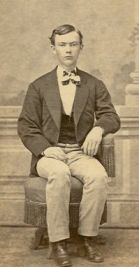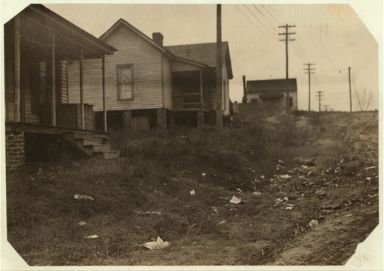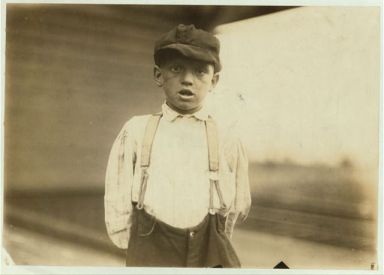Cannon Mills
by Kevin Cherry, 2006; Revised December 2021.
 Cannon Mills, producer of all-purpose cloth and kitchen, bathroom, and bedroom textile products, was founded by James William Cannon, a 35-year-old cotton broker and general merchandiser, in 1887 in Concord. Costing $75,000 and employing 4,000 spindles, the steam-powered Cannon Manufacturing Company produced its first yarn on 1 Apr. 1888. Instead of spinning yarn and sending it to be woven into fabric in northern factories (as was then the rule among southern cotton mills), Cannon began with raw cotton, spun the yarn, and wove it into a finished product called Cannon Cloth. An inexpensive item, this cloth was popular with housewives who sewed items such as shirts and pillowcases at home.
Cannon Mills, producer of all-purpose cloth and kitchen, bathroom, and bedroom textile products, was founded by James William Cannon, a 35-year-old cotton broker and general merchandiser, in 1887 in Concord. Costing $75,000 and employing 4,000 spindles, the steam-powered Cannon Manufacturing Company produced its first yarn on 1 Apr. 1888. Instead of spinning yarn and sending it to be woven into fabric in northern factories (as was then the rule among southern cotton mills), Cannon began with raw cotton, spun the yarn, and wove it into a finished product called Cannon Cloth. An inexpensive item, this cloth was popular with housewives who sewed items such as shirts and pillowcases at home.
When it became clear that factory-sewn pieces would eventually replace simple fabrics, Cannon surveyed the textile industry and decided to fill the towel-making niche. Cannon Manufacturing Company produced its first towels in 1890. The company's early towels, made out of a flat (also known as huck) weave, were designed to be completed by the housewife, who cut and hemmed them to desired sizes. Around the turn of the century, Cannon began to weave a more absorbent towel known as terry or Turkish cloth, a new product for the company and the South that became popular during World War I. By the end of the war, Cannon had become the nation's largest towel producer.
The Cannon textile enterprise expanded rapidly. With various partners, James William Cannon organized Cabarrus Cotton Mills (1892), Patterson Manufacturing Company (1893), Kesler Manufacturing Company (1895), Gibson Manufacturing Company (1901). He also incorporated Coleman Mills in Concord (1906), which had been founded by Warren Clay Coleman, a formerly enslaved person, and predominantly employed black people. In 1906 Cannon bought 600 acres of land located about seven miles north of his first plant in Concord, where he built a planned community that included rental houses and a school. The community became the quintessential "company town" of Kannapolis.
 A 1928 consolidation of nine textile plants into the Cannon Mills Company helped the business survive the Depression. Cannon continued to add to its family of mills throughout most of the twentieth century, buying such companies as Maiden Knitting Mills (1969), Wiscassett Mills Company (1978), and Beacon Manufacturing (1978). Cannon Mills' low debt, fully funded retirement plan, large amount of attractive real estate, and lack of firm family control created an opportunity for a leveraged buyout and hostile takeover. In 1982 David Murdock, a California industrialist, financier, and real estate developer, offered $44 per share for the approximately 9.4 million Cannon shares then selling for $28.92 each. Within 34 days, Murdock controlled 98 percent of Cannon Mills stock at a cost of $413 million.
A 1928 consolidation of nine textile plants into the Cannon Mills Company helped the business survive the Depression. Cannon continued to add to its family of mills throughout most of the twentieth century, buying such companies as Maiden Knitting Mills (1969), Wiscassett Mills Company (1978), and Beacon Manufacturing (1978). Cannon Mills' low debt, fully funded retirement plan, large amount of attractive real estate, and lack of firm family control created an opportunity for a leveraged buyout and hostile takeover. In 1982 David Murdock, a California industrialist, financier, and real estate developer, offered $44 per share for the approximately 9.4 million Cannon shares then selling for $28.92 each. Within 34 days, Murdock controlled 98 percent of Cannon Mills stock at a cost of $413 million.
Murdock reorganized management, invested $200 million in capital improvements, redesigned the company's product lines, and made dramatic changes in Kannapolis by donating parkland, spurring the creation of a senior center and library, and renovating the business district. He also sold company housing and tore down the YMCA, one of the centers of town life.
Negotiations for the sale of Cannon Mills began in 1985, and Fieldcrest Mills, Inc., of Eden, bought Cannon's bath  and bedding operations in January 1986 for $250 million. This purchase included 12 plants and 14 sales offices, which employed nearly all of the company's workers, and created a new corporation, Fieldcrest Cannon, Inc., under the leadership of Joseph B. Ely II. The resulting modernization and automation of production equipment led to a reduction in the number of employees. With the purchase, Fieldcrest doubled in size and became one of the largest producers of home furnishings and textile products in the world. Murdock retained that portion of nonindustrial property owned by Cannon Mills and managed it under the name of Atlantic American Properties.
and bedding operations in January 1986 for $250 million. This purchase included 12 plants and 14 sales offices, which employed nearly all of the company's workers, and created a new corporation, Fieldcrest Cannon, Inc., under the leadership of Joseph B. Ely II. The resulting modernization and automation of production equipment led to a reduction in the number of employees. With the purchase, Fieldcrest doubled in size and became one of the largest producers of home furnishings and textile products in the world. Murdock retained that portion of nonindustrial property owned by Cannon Mills and managed it under the name of Atlantic American Properties.
In December 1997 Pillowtex, Inc., a Dallas-based manufacturer of Ralph Lauren, Martha Stewart, Disney, and other brand-name fabrics and home furnishings, purchased Fieldcrest Cannon for $700 million. Pillowtex declared bankruptcy in 2003, terminating 4,800 jobs in North Carolina. The Cannon brand is now owned by Iconix Brand Group.
References:
Cannon Mills Company, 1887-1987: A Century of Progress (1987).
Paul R. Kearns, Weavers of Dreams (1995).
Iconix Group. Cannon Brand. Website. http://www.iconixbrand.com/brands/cannon/ (Accessed December 2, 2021).
James Lewis Moore and Thomas Herron Wingate, Cabarrus Reborn: A Historical Sketch of the Founding and Development of Cannon Mills Company and Kannapolis (1940).
Additional Resources:
"James W. Cannon 1852-1921." N.C. Highway Historical Marker L-55, N.C. Office of Archives & History. https://www.ncdcr.gov/about/history/division-historical-resources/nc-highway-historical-marker-program/Markers.aspx?sp=Markers&k=Markers&sv=L-55
The History and Culture of Kannapolis, Pillowtex: Five Years Later: http://independenttribune.net/index.php/pillowtex/article/part_1/
Image Credit:
"James W. Cannon 1852-1921." Photograph. N.C. Highway Historical Marker L-55, N.C. Office of Archives & History. https://www.ncdcr.gov/about/history/division-historical-resources/nc-highway-historical-marker-program/Markers.aspx?sp=Markers&k=Markers&sv=L-55 (accessed October 3, 2012).
Some of the housing conditions of the workers in the Cannon Mills, Concord, N.C., to contrast with the homes and gardens some times shown from the "show mills" of the state, 1912. Image courtesy of Library of Congress. Available from http://www.loc.gov/pictures/resource/nclc.02651/ (accessed October 2, 2012).
Herman Parker, 6 years old, worked at Cannon Mills, Kannapolis, NC, 1912. Image courtesy of Library of Congress. Available from http://www.loc.gov/pictures/item/ncl2004003697/PP/ (accessed October 2, 2012).
1 January 2006 | Cherry, Kevin